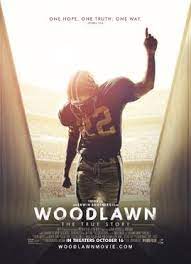WOODLAWN
US, 2015, 123 minutes, Colour.
Sean Astin, Nic Bishop, Caleb Castille, Jon Voight, Lance E.Nichols, Sherri Shepherd, Joy Brunson, C.Thomas Howell, Kevin Sizemore, DeVon Franklin.
Directed by Andrew Erwin, John Erwin.
 Woodlawn is the name of the college in Alabama in the 1960s and 70s.
Woodlawn is the name of the college in Alabama in the 1960s and 70s.
The opening of the film, the opening credits, highlight themes of segregation at the time, the role of Martin Luther King, the role of the governor, George Wallace, the prejudices of the times, the harsh consequences of segregation. By 1970, when this film opens, there are moves towards integration.
However, this is also a religious film, strongly so, explicitly so. And it is the work of the Irwin brothers who during the 2010 is, built up quite a reputation, along with the also-productive Kendrick brothers, in providing faith films for the American audience, films which did very well at the box office. The Irwin’s were not always so explicitly religious, “focusing on more “secular” themes and leaving it to the audience for their faith response. However, this is a film about the Jesus Revolution of the time, taking its cue from a Time Magazine cover. There is an emphasis on religious music, I Still Believe, I Can Only Imagine.
The focus of this film is on American football, as played out Woodlawn College, a focus on the coach, who begins with a touch of racism and intolerance but who experiences of religious conversion, being baptised, supporting his team. There are the school authorities and the local education authorities who react badly about religious behaviour, especially prayer before games, of open rallies before games, separation between church and state.
But there is also a focus on a champion footballer, Tony Nathan (Caleb Castille), African-American, sympathetic family, friends at school, but experiencing racism, coming through the crises and leading the Woodlawn team to victories (unexpected victories). In fact, Tony Nathan is an actual character in the final credits give information about him as well is various other members of the cast and their careers, especially in football.
The Irwin brothers have the ability to invite name actors to participate in their films, in this case Jon Voight and C.Thomas Howell as well is Sean Astin as a committed preacher who influences the team and the coach.
- A faith-based film? Explicit? Based on the 1970s came Jesus Revolution?
- The work of the directors, their faith background, Alabama, race issues, integration, sports issues, there sports filming background, music videos?
- True story, the 1970s, the significance of the credits, black-and-white photos and clips, race relationships, antagonism, segregation, killings, Martin Luther King? George Wallace and segregation forever? The setting for the transition, 1970-1980?
- Audience response to faith-based films? Believers and their enthusiasm? Non-religious and their scepticism? Accusations of preaching and manipulation?
- The football focus, audience response to the game, the highlights of the particular games of the 1970s? Practice?
- Tony Nathan, age, experience, school, segregation, memories of discrimination? The bond with his parents? The younger brother? The episode of the brick through the window? At the church, the preacher, enthusiasm? At school, his friends, football practice, the games? His career, the award and his refusing to be photographed with the racist? His girlfriend, shyness, the bus, bonding, her turning him away, her father? His standing up to her father? Her support?
- The administration of the school, separation of church and state, no explicit religious prayers and ceremonies? The meetings with the coach, his initial scepticism, the chairman of the board, all in the coach over the calls, threatening him?
- Hank, preacher, his story, work, accident, injury, his cane? Religious background, enthusiasm? Speaking to the members of the team, his speech, their raising their hands, joining him, prayer? Prayer is part of the preparation of the game? The significance of the huge rally before the game? The rally and the lighting the candles? (And the influence of Billy Graham and his rallies, seen at the beginning, the long focus on Billy Graham at the end, faith, Jesus, peace, transforming the world?)
- The coach, with his family, secular, brought up with racist attitudes? With the team, love for coaching? Puzzled by Hank? Interactions with the team, the various games, training, morale boosting? His change of heart, and experience conversion, the men and their prayer, going to the church, his speech, his being baptised? His son going along to help him with the coaching?
- The coach, Bear Bryant, the beginning of the film, his observations? Later return, the visit to the Nathan household, discussions, encouragement of Tony? Scouting him for his later career?
- The other members of the team, skills, working together, prayer, morale?
- Shorty, the southern type, raucous, racist, coaching, his player and the award? Loud, interactions with the coach? The plan for the two teams training together, the summer camp, the effect, change with Shorty?
- The years of matches, the scenes of the matches, the commentators, Woodlawn improving? The authorities and antagonism?
- Years later, Tony Nathan and his success, the phone call to the coach, the coach selling insurance, encouraged by Tony, putting his baseball cap on again?
- The final credits and the information about each of the central characters, their careers, success? In the 1970s and the Jesus Revolution?